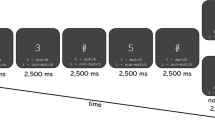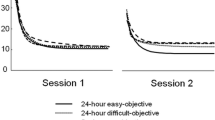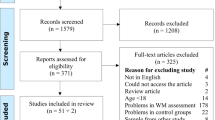Abstract
Working memory (WM) can influence selective attention. However, the effect of WM load on postural standing tasks has been poorly understood, even though these tasks require attentional resources. The purpose of this study was to examine whether WM load would impact anticipatory postural adjustments (APAs) during step initiation. Sixteen healthy young adults performed stepping tasks alone or concurrently with a WM task in a dual-task design. The stepping tasks involved volitional stepping movements in response to visual stimuli and comprised of simple and choice reaction time tasks and the Flanker task which consisted of congruent and incongruent (INC) conditions. In the dual-task condition, subjects were required to memorize either one or six digits before each stepping trial. Incorrect weight transfer prior to foot-lift, termed APA errors, reaction time (RT), and foot-lift time were measured from the vertical force data. The results showed that APA error rate was significantly higher when memorizing six-digit than one-digit numerals in the INC condition. In addition, RT and foot-lift time were significantly longer in the INC condition compared to the other stepping conditions, while there was no significant effect of WM load on RT or foot-lift time. These findings suggest that high WM load reduces the cognitive resources needed for selective attention and decision making during step initiation.




Similar content being viewed by others
Data availability
The data of this study are available from the corresponding author on reasonable request.
References
Anstey KJ, von Sanden C, Luszcz MA (2006) An 8-year prospective study of the relationship between cognitive performance and falling in very old adults. J Am Geriatr Soc 54:1169–1176. https://doi.org/10.1111/j.1532-5415.2006.00813.x
Baddeley A (2010) Working memory. Curr Biol 20:R136–140. https://doi.org/10.1016/j.cub.2009.12.014
Coelho DB, Bazan PR, Zimeo Morais GA et al (2021) Frontal hemodynamic response during step initiation under cognitive conflict in older and Young Healthy people. J Gerontol Biol Sci Med Sci 76:216–223. https://doi.org/10.1093/gerona/glaa125
Cohen RG, Nutt JG, Horak FB (2011) Errors in postural preparation lead to increased choice reaction times for step initiation in older adults. J Gerontol Biol Sci Med Sci 66:705–713. https://doi.org/10.1093/gerona/glr054
Dault MC, Frank JS, Allard F (2001) Influence of a visuo-spatial, verbal and central executive working memory task on postural control. Gait Posture 14:110–116. https://doi.org/10.1016/s0966-6362(01)00113-8
de Lima-Pardini AC, de Azevedo Neto RM, Coelho DB et al (2017) An fMRI-compatible force measurement system for the evaluation of the neural correlates of step initiation. Sci Rep 7:43088. https://doi.org/10.1038/srep43088
Delafontaine A, Vialleron T, Hussein T, Yiou E, Honeine JL, Colnaghi S (2019) Anticipatory postural adjustments during gait initiation in Stroke patients. Front Neurol 10:352. https://doi.org/10.3389/fneur.2019.00352
Delbaere K, Gschwind YJ, Sherrington C, Barraclough E, Garrues-Irisarri MA, Lord SR (2016) Validity and reliability of a simple ‘low-tech’ test for measuring choice stepping reaction time in older people. Clin Rehabil 30:1128–1135. https://doi.org/10.1177/0269215515613422
Ejupi A, Brodie M, Gschwind YJ, Schoene D, Lord S, Delbaere K (2014) Choice stepping reaction time test using exergame technology for fall risk assessment in older people. Annu Int Conf IEEE Eng Med Biol Soc 2014:6957–6960. https://doi.org/10.1109/EMBC.2014.6945228
Handy TC, Soltani M, Mangun GR (2001) Perceptual load and visuocortical processing: event-related potentials reveal sensory-level selection. Psychol Sci 12:213–218. https://doi.org/10.1111/1467-9280.00338
Jacobs JV, Lou JS, Kraakevik JA, Horak FB (2009) The supplementary motor area contributes to the timing of the anticipatory postural adjustment during step initiation in participants with and without Parkinson’s disease. Neuroscience 164:877–885. https://doi.org/10.1016/j.neuroscience.2009.08.002
Kitatani R, Furukawa K, Sakaue D, Otsuru N, Onishi H (2023) Influences of different cognitive loads on central common neural drives to the ankle muscles during dual-task walking. Neurosci Lett 804:137214. https://doi.org/10.1016/j.neulet.2023.137214
Konstantinou N, Beal E, King JR, Lavie N (2014) Working memory load and distraction: dissociable effects of visual maintenance and cognitive control. Atten Percept Psychophys 76:1985–1997. https://doi.org/10.3758/s13414-014-0742-z
Lavie N, Hirst A, de Fockert JW, Viding E (2004) Load theory of selective attention and cognitive control. J Exp Psychol Gen 133:339–354. https://doi.org/10.1037/0096-3445.133.3.339
Liu-Ambrose TY, Nagamatsu LS, Handy TC, Leghari A (2008) Does impaired cerebellar function contribute to risk of falls in seniors? A pilot study using functional magnetic resonance imaging. J Am Geriatr Soc 56:2153–2155. https://doi.org/10.1111/j.1532-5415.2008.01984.x
Lord SR, Fitzpatrick RC (2001) Choice stepping reaction time: a composite measure of falls risk in older people. J Gerontol Biol Sci Med Sci 56:M627–632. https://doi.org/10.1093/gerona/56.10.m627
Lugtmeijer S, Lammers NA, de Haan EHF, de Leeuw FE, Kessels RPC (2021) Post-stroke Working Memory Dysfunction: a Meta-analysis and systematic review. Neuropsychol Rev 31:202–219. https://doi.org/10.1007/s11065-020-09462-4
Murty VP, Sambataro F, Radulescu E et al (2011) Selective updating of working memory content modulates meso-cortico-striatal activity. NeuroImage 57:1264–1272. https://doi.org/10.1016/j.neuroimage.2011.05.006
Oldfield RC (1971) The assessment and analysis of handedness: the Edinburgh inventory. Neuropsychologia 9:97–113. https://doi.org/10.1016/0028-3932(71)90067-4
Osaka M, Osaka N, Kondo H, Morishita M, Fukuyama H, Aso T, Shibasaki H (2003) The neural basis of individual differences in working memory capacity: an fMRI study. NeuroImage 18:789–797. https://doi.org/10.1016/s1053-8119(02)00032-0
Pijnappels M, Delbaere K, Sturnieks DL, Lord SR (2010) The association between choice stepping reaction time and falls in older adults–a path analysis model. Age Ageing 39:99–104. https://doi.org/10.1093/ageing/afp200
Pratt N, Willoughby A, Swick D (2011) Effects of working memory load on visual selective attention: behavioral and electrophysiological evidence. Front Hum Neurosci 5:57. https://doi.org/10.3389/fnhum.2011.00057
Rose M, Schmid C, Winzen A, Sommer T, Buchel C (2005) The functional and temporal characteristics of top-down modulation in visual selection. Cereb Cortex 15:1290–1298. https://doi.org/10.1093/cercor/bhi012
Scharinger C, Soutschek A, Schubert T, Gerjets P (2015) When flanker meets the n-back: what EEG and pupil dilation data reveal about the interplay between the two central-executive working memory functions inhibition and updating. Psychophysiology 52:1293–1304. https://doi.org/10.1111/psyp.12500
Schoene D, Smith ST, Davies TA, Delbaere K, Lord SR (2014) A Stroop stepping test (SST) using low-cost computer game technology discriminates between older fallers and non-fallers. Age Ageing 43:285–289. https://doi.org/10.1093/ageing/aft157
Sparto PJ, Fuhrman SI, Redfern MS, Jennings JR, Perera S, Nebes RD, Furman JM (2013) Postural adjustment errors reveal deficits in inhibition during lateral step initiation in older adults. J Neurophysiol 109:415–428. https://doi.org/10.1152/jn.00682.2012
Sreenivasan KK, Jha AP (2007) Selective attention supports working memory maintenance by modulating perceptual processing of distractors. J Cogn Neurosci 19:32–41. https://doi.org/10.1162/jocn.2007.19.1.32
St George RJ, Fitzpatrick RC, Rogers MW, Lord SR (2007) Choice stepping response and transfer times: effects of age, fall risk, and secondary tasks. J Gerontol Biol Sci Med Sci 62:537–542. https://doi.org/10.1093/gerona/62.5.537
Sun R, Shea JB (2016) Probing attention prioritization during dual-task step initiation: a novel method. Exp Brain Res 234:1047–1056. https://doi.org/10.1007/s00221-015-4534-z
Suzuki M, Miyai I, Ono T, Oda I, Konishi I, Kochiyama T, Kubota K (2004) Prefrontal and premotor cortices are involved in adapting walking and running speed on the treadmill: an optical imaging study. NeuroImage 23:1020–1026. https://doi.org/10.1016/j.neuroimage.2004.07.002
Takakusaki K (2017) Functional neuroanatomy for posture and Gait Control. J Mov Disord 10:1–17. https://doi.org/10.14802/jmd.16062
Tateuchi H, Ichihashi N, Shinya M, Oda S (2011) Anticipatory postural adjustments during lateral step motion in patients with hip osteoarthritis. J Appl Biomech 27:32–39. https://doi.org/10.1123/jab.27.1.32
Uemura K, Oya T, Uchiyama Y (2013) Effects of visual interference on initial motor program errors and execution times in the choice step reaction. Gait Posture 38:68–72. https://doi.org/10.1016/j.gaitpost.2012.10.016
Vartanian O, Jobidon ME, Bouak F, Nakashima A, Smith I, Lam Q, Cheung B (2013) Working memory training is associated with lower prefrontal cortex activation in a divergent thinking task. Neuroscience 236:186–194. https://doi.org/10.1016/j.neuroscience.2012.12.060
Watanabe T, Koyama S, Tanabe S, Nojima I (2015) Accessory stimulus modulates executive function during stepping task. J Neurophysiol 114:419–426. https://doi.org/10.1152/jn.00222.2015
Watanabe T, Ishida K, Tanabe S, Nojima I (2016a) Preparatory state and postural adjustment strategies for choice reaction step initiation. Neuroscience 332:140–148. https://doi.org/10.1016/j.neuroscience.2016.06.055
Watanabe T, Tsutou K, Saito K, Ishida K, Tanabe S, Nojima I (2016b) Performance monitoring and response conflict resolution associated with choice stepping reaction tasks. Exp Brain Res 234:3355–3365. https://doi.org/10.1007/s00221-016-4733-2
Watanabe T, Saito K, Ishida K, Tanabe S, Nojima I (2017) Auditory stimulus has a larger effect on anticipatory postural adjustments in older than young adults during choice step reaction. Eur J Appl Physiol 117:2409–2423. https://doi.org/10.1007/s00421-017-3727-5
Watanabe T, Saito K, Ishida K et al (2018) Effect of auditory stimulus on executive function and execution time during cognitively demanding stepping task in patients with Parkinson’s disease. Neurosci Lett 674:101–105. https://doi.org/10.1016/j.neulet.2018.03.032
Wei H, Zhou R (2020) High working memory load impairs selective attention: EEG signatures. Psychophysiology 57:e13643. https://doi.org/10.1111/psyp.13643
Wei H, Yao Y, Zhou L (2022) Concurrent working memory task increases or decreases the flanker-related N2 amplitude. Front Psychol 13:962153. https://doi.org/10.3389/fpsyg.2022.962153
Wobbrock JO, Findlater L, Gergle D, Higgins JJ (2011) The aligned rank transform for nonparametric factorial analyses using only anova procedures. Proceedings of the SIGCHI conference on human factors in computing systems:143–146 https://doi.org/10.1145/1978942.1978963
Wu Y, Zang M, Wang B, Guo W (2023) Does the combination of exercise and cognitive training improve working memory in older adults? A systematic review and meta-analysis. PeerJ 11:e15108. https://doi.org/10.7717/peerj.15108
Acknowledgements
We are grateful to all the participants who have devoted their time and effort to this work.
Funding
This study was partially supported by a grant from Japan Society for the Promotion of Science (22K17777).
Author information
Authors and Affiliations
Corresponding author
Ethics declarations
Ethical approval
Ethical approval was obtained from the ethics committee of Aomori University of Health and Welfare. The experimental procedures adhere to the tenets of the Declaration of Helsinki.
Informed consent
Informed consent was obtained from all individual participants included in the study.
Conflict of interest
The authors declare that they have no conflict of interest.
Additional information
Communicated by Winston D Byblow.
Publisher’s Note
Springer Nature remains neutral with regard to jurisdictional claims in published maps and institutional affiliations.
Rights and permissions
Springer Nature or its licensor (e.g. a society or other partner) holds exclusive rights to this article under a publishing agreement with the author(s) or other rightsholder(s); author self-archiving of the accepted manuscript version of this article is solely governed by the terms of such publishing agreement and applicable law.
About this article
Cite this article
Minami, K., Yamanaka, E., Okuyama, K. et al. Working memory load modulates anticipatory postural adjustments during step initiation. Exp Brain Res (2024). https://doi.org/10.1007/s00221-024-06820-z
Received:
Accepted:
Published:
DOI: https://doi.org/10.1007/s00221-024-06820-z




